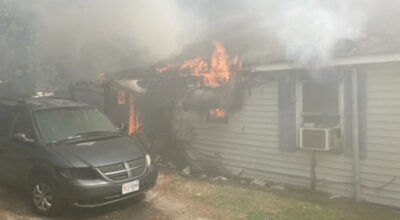The murder of Grac Jones: Chapter 13
Published 5:46 pm Saturday, August 8, 2015
Closing arguments
EDITOR’S NOTE: On the evening of Oct. 26, 1908, five shots rang out in the village of Holland. Tiberius Gracchus “Grac” Jones lay dying on the ground inside the gate leading to his home. “They have killed me and killed me for telling the truth,” he told a friend as his life ebbed away. This is the 13th in a series of articles about the Jones murder case. Suffolk historian Kermit Hobbs Jr. compiled the 18-part series from personal accounts, newspaper stories and court records he has studied from the period.
By Kermit Hobbs Jr.
Special to the News-Herald
All testimony in the case was completed on Friday morning, Feb. 5. Closing arguments began at 11 a.m. and would last all day and into the evening.
The Virginian-Pilot newspaper reported the scene at the Nansemond County courthouse that Friday morning, as closing arguments began. “The packed mass of humanity on the inside, with others struggling for a look in from the doors and windows, heard with almost breathless interest the closing presentation, whose impressiveness approached the histrionic.”
Judge James L. McLemore began the day’s session by giving instructions to the jury. He explained the difference between first and second degree murder; he told them how to evaluate circumstantial evidence; and he explained the concept of “reasonable doubt.”
He explained that it was completely up to the jury to decide whether or not to believe any particular witness’s testimony, but he cautioned them to consider how close each witness was to the defendant in deciding whether or not to believe him.
At the request of the defense, Judge McLemore reminded the jurors that the defendant is considered innocent until proven guilty and that the burden of proof rests on the state. A preponderance of evidence is not sufficient to bring a conviction.
Robert W. Withers, attorney for the prosecution, was the first to give a closing argument. For a little more than an hour, Withers elaborated on the difference between circumstantial and direct evidence. He went over the facts that had been presented and argued that the evidence, albeit circumstantial, was more than sufficient to convict Sam Hardy.
The next speaker was Seth Everett, representing the defense team. Everett spent an hour portraying Grac Jones as a meddler in everyone’s business. He went on to praise Mrs. Holland as a fine example of Virginia womanhood. He recalled her unyielding testimony under the prosecution’s grueling cross-examination, and he noted that a guilty verdict would, in effect, call her a liar.
Commonwealth’s Attorney James Burges responded by stating that he wished that there were more meddlers like Grac Jones, who were willing to report unlawful acts. If there were, Nansemond County “would be one of the best counties in the world.”
Judge R.H. Rawls, an attorney for the defense, expressed confidence in the evidence presented in proving the innocence of Sam Hardy. He challenged the jury not to compromise in their decision regarding Hardy’s guilt. “If he is guilty,” he implored, “then bring a first degree verdict; if not, then set him free and release him from the accusations that have been pointed at him.”
Judge T.H. Wilcox, another member of the defense team, argued that Sam Hardy could not have possibly committed the murder of Grac Jones, because he had been proven to have been in his room, in his bed, at the time of the murder.
The final closing argument was given by Col. Cabell for the prosecution. He began speaking at 8 p.m. and continued for nearly three hours. Cabell’s oration was described as “eloquent, dramatic, pathetic, appealing, and at times almost tragic in its intensity.”
“You may not want to convict this man,” he told the jury, “you may not do it. But if you acquit him, you have to do it with your eyes open. You have got to know the facts. There must be no excuses.”
Closing arguments were completed at 11 p.m. Friday. The case was turned over to the jury at that time, but deliberations would not begin until the following morning, Feb. 6.
TUESDAY: The jury and the verdict
So do you think Sam Hardy is guilty? Vote on the poll on the home page or visit our Facebook page to weigh in with your thoughts!







